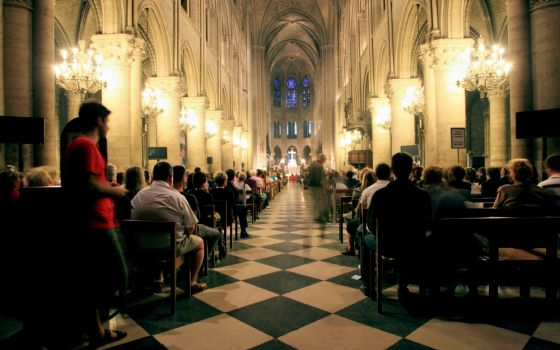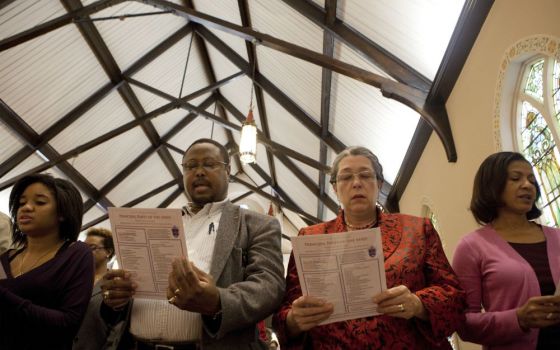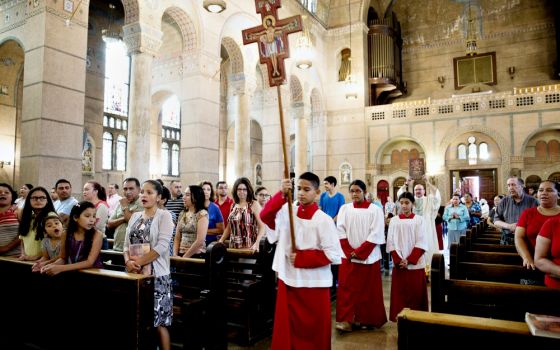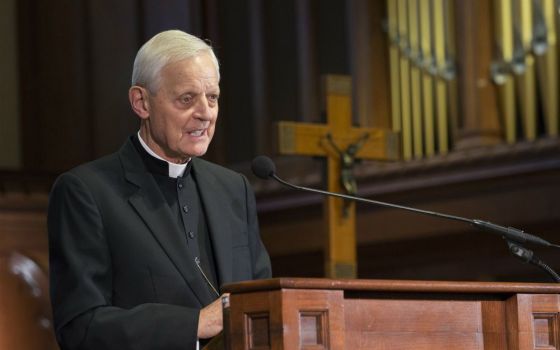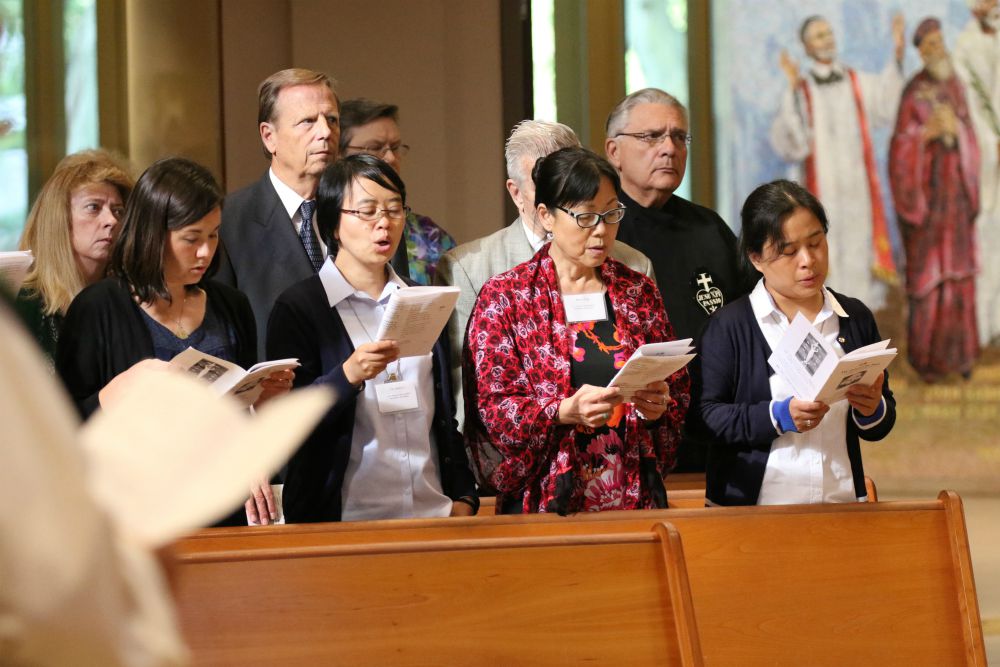
Worshippers sing during Mass Aug. 12 at St. John's University in Jamaica, New York. (CNS/Gregory A. Shemitz)
This article was updated Sept. 12, 3:28 p.m. CDT.
The change to church law governing liturgical translations released by the Vatican over the weekend is "good news," liturgical experts say. But Catholics should not stop saying, "And with your Spirit," just yet.
Any revisions to language at Masses in the United States will not happen immediately and will be primarily up to the U.S. bishops now.
In a document called a "motu proprio" titled Magnum Principium released Sept. 9 while Pope Francis was in Colombia, the pontiff announced a change to the church's Code of Canon Law to decentralize the process for approving translations of liturgical texts, returning responsibility for the matter back to national bishops' conferences, rather than the Vatican.
But liturgical experts in the U.S. — especially those who disagreed with the process and much of the content of the translations to the missal instituted in 2011 — are celebrating this shift and are predicting it will lead to better English translations, at least eventually.
"This is a victory for collegiality and a victory for the [Second Vatican] Council Fathers," says Bishop Donald Trautman, retired bishop of Erie, Pennsylvania, who formerly chaired the U.S. bishops' Committee on Liturgy. As head of that committee, Trautman led an effort to stop or delay the new missal translations, which he described as full of grammatical errors and unproclaimable texts.
Advertisement
Trautman said the new rule will help facilitate the community's full and active participation in the Eucharist called for by Vatican II's Constitution on the Sacred Liturgy. "To have that, they have to have clarity of understanding of the language used," and that's not happening now, he says.
A 2014 poll found widespread disapproval of the translation, with a vast majority of leaders at U.S. parishes saying it was "awkward and distracting" and half agreeing it "urgently needs to be revised."
Trautman says Magnum Principium "takes the wind out of the sails of the 'reform of the reform' movement," which seeks to return to pre-Vatican II liturgy, and "in my mind, puts an end to Liturgiam authenticam," the 2001 instruction that insisted on literal translation from the Latin. It also banned inclusive language and diminished the role of episcopal conferences.
The change is likely to fan the flames of the "liturgy wars" — and if tweets and blog posts from the weekend are any indication, shots have already been fired. Catholics reacting to this news on blogs and Twitter over the weekend were of two minds. Those who favor less literal translations that are more easily understandable in the vernacular are cheering, while those opposed to such "dynamic equivalence" are consoling themselves that at least they still have the "Latin Mass."
We don't know what the future holds, but it's hard to be a lover of the English language and not see #magnumprincipium as good news.
— Bravo (@B_Bravo9) September 9, 2017
Magnum Principium was signed by Archbishop Arthur Roche, secretary for the Congregation for Divine Worship and the Discipline of the Sacraments, not by Cardinal Robert Sarah, the congregation's prefect. This caused some speculation that Sarah may not be in favor of the changes.
But Benedictine Fr. Anthony Ruff, associate professor at St. John's School of Theology and Seminary in Collegeville, Minnesota, said the pope's move merely "follows Vatican II to a 'T.'"
"This fits entirely with Pope Francis' vision for collegiality and healthy decentralization," says Ruff, an expert in liturgical music and Gregorian chant and contributor to the PrayTell blog.
"I would even say this document really calls the question: 'Do we believe in Vatican II or not?' " Ruff says. "The pope is not hijacking the council, or asserting his pet idiosyncratic agenda. He is doing exactly what the council called for."
Magnum Principium also seems to further confirm Pope Francis' comments last month to the Italian Liturgical Conference that the liturgical reform of Vatican II is "irreversible."
The change will continue this papacy's de-emphasis on the Vatican curia, while giving regional bishops' conferences more power, at least on liturgical matters. What those bishops' conferences — including the U.S. Conference of Catholic Bishops — do with that power remains to be seen, however.
"This document makes possible a really good collaborative relationship between Rome and the bishops, but it all depends on how they run with this," Ruff says. "It's way too early to know where this will go."
Latin. Latin is the answer. #magnumprincipium only helps publishing houses and enemies of the Church.
— Michael Sproule (@msproule1) September 10, 2017
Ruff does not expect any immediate changes. "I trust that our bishops will know the right time to even think about revising the missal. It's probably not now," he says. "I would not favor changing the people's responses at this point, unless the bishops think one or two words or phrases would help the people."
Ruff's first candidate for possible change: "consubstantial" in the Nicene Creed (formerly "one in being with the Father … .") "I would be open to "of one substance," he says.
More immediate impact is likely for Catholics in European and Latin American countries, where the bishops did not move forward with literal translations according to Liturgiam authenticam.
"I do not see this directed at the United States," says Ruff, "but I do think it is putting a great trust in all bishops, including the U.S. bishops. As that gradually sinks in, I think the bishops will appreciate and use the authority they are now given."
Trautman says Magnum Principium may be something of a test for the U.S. hierarchy. "We should all be grateful to Pope Francis for his pastoral instinct," Trautman says. "Now it's up to the bishops to respond."
Updated material begins here:
Change may be seen in future translations, however, including the Liturgy of the Hours, which is currently being worked on, says Msgr. Rick Hilgartner, pastor of St. Joseph Parish in Cockeysville, Maryland, and former executive director of the U.S. bishops' Office for Divine Worship when the 2011 missal was revised.
Hilgartner think it's too early to redo the missal, especially since many priests have never used some of the optional versions of the texts. "I think we need to give it some time to grow accustomed to it," he says. "The same thing happened in 1970 when we went to the English translations."
Still, perhaps some "editorial changes" could happen in the future, he says, although even small changes would require reprinting of the texts used by parishes, which raises issues of economic justice. "There is the possibility that bishops' conferences could say they want to take a second look at some questions that were unanswered before," he says.
Changes to the people's responses anytime soon, Hilgartner believes, would be "too disruptive."
"There are far bigger issues facing the church today: advocacy for the poor and immigrants, evangelization," Hilgartner says. "To spend all our time tinkering with liturgical texts isn't the best use of our resources at the moment."
Still, Hilgartner sees significance in the change to the law, in that its spirit implies a relationship of trust between the bishops' conferences and the Holy See, with the responsibility of translating liturgical texts now lying with episcopal conferences.
"The best hope for this is that the [Vatican] Congregation for Divine Worship will see its role as simply accepting the judgment of the conferences. In recent years, that has not been the case," he says.
He also hopes it results in "bishops [having] a greater sense of confidence that their work will be accepted."
This decision expands upon Francis' other moves toward more collegiality, Hilgartner says. "His whole approach to governance of the church has been very respectful of the role of bishops. This liturgical piece has been out of step."
A priest who led an effort to slow down the implementation of the 2011 new missal agrees, and says decisions about liturgical translations are best done at the local level.
But the U.S. bishops turned a deaf ear to complaints about the 2011 translation and may have "too much invested" in that translation now, says Fr. Michael Ryan, pastor of St. James Cathedral in Seattle.
"Clearly, there was a great amount of dissatisfaction on the part of priests who have to pray these awkward prayers and on the part of the people," Ryan says.
But revising the priest's part of the Mass prayers wouldn't be difficult, he says.
"We have a much better translations of those prayers," Ryan says, referring to the one from the International Commission on English in the Liturgy, known by its acronym, ICEL. That translation, from 1998, was never approved by the Vatican. "It's elegant, beautiful and happens to be good English, but it's just gathering dust in the Vatican."
To critics concerned that such decentralization of liturgical translations may lead to disunity in the church, Ryan notes that "unity is not the same as uniformity."
"Unity is in the faith and what we do in the essence of our prayer," he says. "To say we all have the have the exact same words doesn't take into account that there are cultural differences that color our use of language."
Still, like many others, Ryan sees this change as a return to the principles of liturgical reform from Vatican II, which gave bishops' conferences substantial authority on matters of liturgy, much of which was lost with Liturgiam authenticam.
"This is setting things right after 16 years of a serious departure from the Second Vatican Council," Ryan says. "I feel the Holy Spirit, who guided the Fathers of Vatican II, is the winner here. I'm just sorry it didn't happen sooner."
Editor's note: This is a developing story. Watch https://www.ncronline.org/feature-series/magnum-principium/stories for updates.
[Heidi Schlumpf is NCR national correspondent. Her email address is hschlumpf@ncronline.org. Follow her on Twitter @HeidiSchlumpf.]





